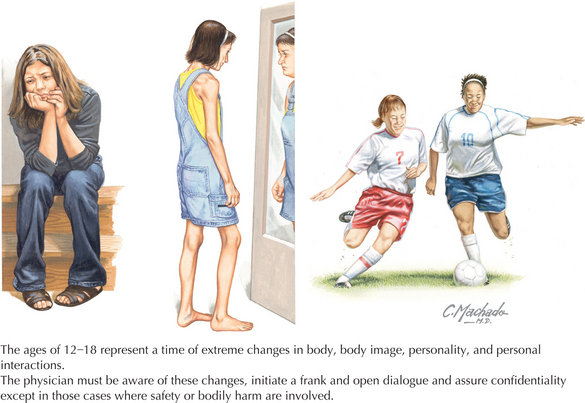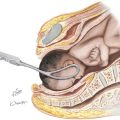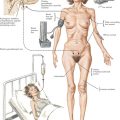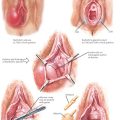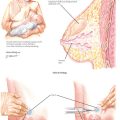Chapter 2 Health Maintenance: Ages 12–18 Years
IMPORTANT CONSIDERATIONS (PHYSIOLOGIC CHANGES)
Screening
History
Laboratory (only as dictated by the patient’s history)
Periodic:
COUNSELING
The main purpose of the initial reproductive health visit is preventive health, including educational information, rather than problem-focused care. Preventive counseling for parents or other supportive adults can include discussions about physical, sexual, and emotional development; signs and symptoms of common conditions affecting adolescents; and encouragement of lifelong healthy behaviors.
COUNSELING RESOURCES
Grunbaum JA, Kann L, Kinchen S, et al. Youth risk behavior surveillance—United States, 2003. MMWR Surveill Summ 53 2004 1 Errata MMWR Morb Mortal Wkly Rep. 2004;53:536. and 2005;54:608.
Mosher WD, Chandra A, Jones J. Sexual behavior and selected health measures: Men and women 15–44 years of age, United States, 2002. Adv Data. 2005;362:1.
American College of Obstetricians and Gynecologists. Cervical cancer screening in adolescents. ACOG Committee Opinion No. 300. Obstet Gynecol. 2004;104:885.
American College of Obstetricians and Gynecologists. Confidentiality in adolescent health care. In: Health Care for Adolescents. Washington, DC: ACOG; 2003:25.
American College of Obstetricians and Gynecologists. Guidelines for Women’s Health Care, 2nd ed. Washington, DC: ACOG, 2002.
American College of Obstetricians and Gynecologists. Initial reproductive health visit. Committee Opinion No. 335. Washington, DC: ACOG, 2006.
American College of Obstetricians and Gynecologists. Meningococcal vaccination for adolescents. Committee Opinion 314. Washington, DC: ACOG, 2005.
American College of Obstetricians and Gynecologists. Primary and Preventive Care. Clinical Updates in Women’s Health Care. 2007;VI(2):1.
American College of Obstetricians and Gynecologists. Primary and preventive health care for female adolescents. In: Health Care for Adolescents. Washington, DC: ACOG; 2003:1.
American College of Obstetricians and Gynecologists. Routine Cancer Screening. Committee Opinion No. 356. Washington, DC: ACOG, 2006.
American College of Obstetricians and Gynecologists. Tool kit for teen care. Washington, DC: ACOG, 2003.
Lentz GM. History, physical examination, and preventive health care. In: Katz VL, Lentz GM, Lobo RA, Gershenson DM, editors. Comprehensive Gynecology. 5th ed. Philadelphia: Mosby/Elsevier; 2007:148.
Ornstein RM, Fisher MM. Hormonal contraception in adolescents: special considerations. Paediatr Drugs. 2006;8:25.
Zuckerbrot RA, Maxon L, Pagar D, et al. Adolescent depression screening in primary care: Feasibility and acceptability. Pediatrics. 2007;119:101.

